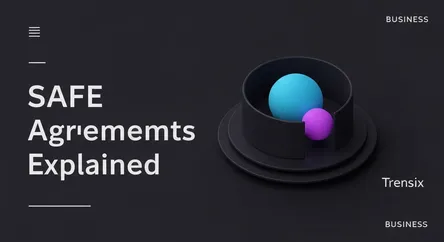Business
SAFE Agreements Explained

Learn about SAFE (Simple Agreement for Future Equity) notes, a popular funding tool for early-stage startups created by Y Combinator.
What is it?
A SAFE (Simple Agreement for Future Equity) is a financing contract used by early-stage startups to raise capital. Created by accelerator Y Combinator, it allows an investor to provide cash to a company in exchange for the right to receive equity at a future date, typically during a formal funding round. Unlike a convertible note, a SAFE is not debt; it has no interest rate or maturity date. It's essentially a warrant to purchase future stock, often including terms like a valuation cap or a discount to protect the early investor’s stake.
Why is it trending?
SAFEs are trending because they radically simplify and accelerate early fundraising. They let founders secure capital quickly without getting bogged down in complex valuation negotiations when the company is too young to have a concrete worth. This speed is critical for startups that need to focus on building their product. The standardized, founder-friendly document was popularized by Y Combinator and significantly reduces legal costs and negotiation time compared to traditional equity financing, making it a popular choice for both founders and investors in the pre-seed and seed stages.
How does it affect people?
For founders, SAFEs provide a fast way to get funding without immediately setting a premature valuation. This helps them maintain control and focus on growth. For investors, SAFEs offer a simple way to get into promising companies early. Terms like valuation caps and discounts reward their early-stage risk by ensuring they receive a better price on their equity than later investors. Ultimately, SAFEs lower the barrier to early-stage investment, making it easier for innovative ideas to get the capital they need to get started and thrive.